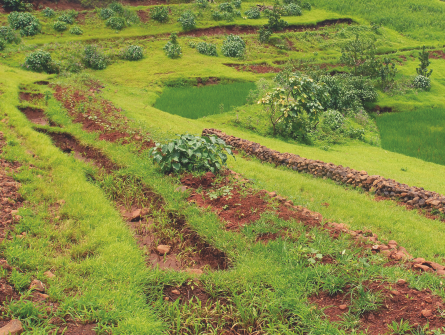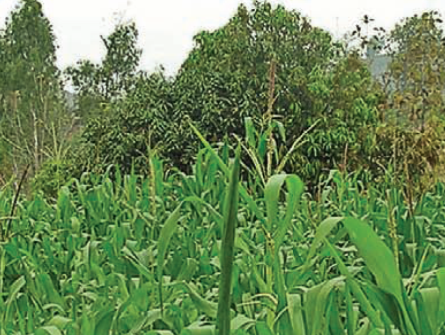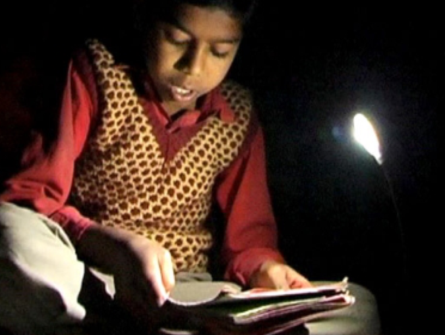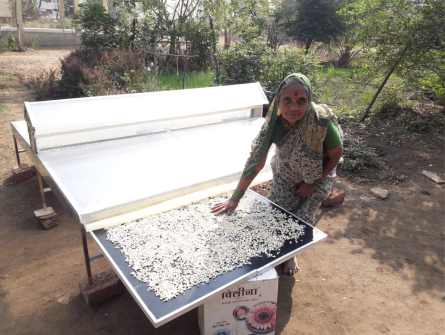Emerging Thematic Areas
[breadcrumb]
New initiatives have been taken up in emerging thematic areas including Renewable Energy, Information and Communications Technology and Bio-recycling.
Renewable Energy
The newer technologies include water ATM, Waterboxx, Talya tray, Solar lamp assembly, Micro Solar dome, Solar drying of vegetables, Solar pumping systems and Solar insect traps.
Solar energy for pumping: As solar pumping for agriculture is in great demand, BAIF has introduced 84 solar water-pumping ranging from 1-5 hp capacity through various projects and in convergence with on-going Government schemes.

BAIF has also installed solar lights at the household level as well as on community streets at various locations. The work also included the Million SoUL programme which aimed at localization of solar energy through local assembly, sale and usage of solar urja lamps (SoUL)”, n collaboration with IIT Bombay.
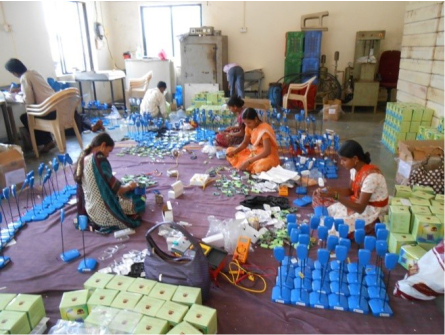
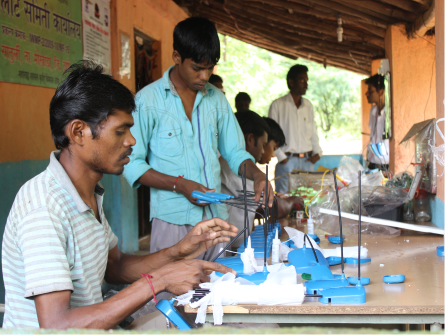
Solar Dryer for dehydration of fruits and vegetables: Farmers in our project areas are encountered with compelling market price dynamics. In the absence of any suitable mechanism they are forced to sell their perishable produce at a price which can hardly cover the cost of production. Moreover, only the best quality produce receive the desired market price while the lower grades are rejected. To enable poor farmers to sell their produce at a remunerative price, 186 solar dryers for dehydration of fruits and vegetables have been installed at Urulikanchan, Jawhar and Nandurbar areas. Out of these, 125 installed at Urulikanchan are being operated on an enterprise mode. This post‐harvest technique which aligns with decentralized processing with focus on price hedging, livelihood and decentralized enterprise mechanism, enables poor women to adopt this activity as an additional source of income.
Information and Communications Technology (ICT)
BAIF is adopting the latest information and communications technology (ICT) tools to strengthen its field based initiatives. Work on multiple ICT platforms has been taken up to de velop a greater connect with people on the ground. In collaboration with Tata Consultancy Services, BAIF has launched the Godhan Seva app powered by mKRISHI® platform, which enables the end-to-end data management of livestock breeding services offered by BAIF.

Calling Rural India
Using ICT for Knowledge Dissemination

Digital literacy is also being promoted across our footprints through Training of Trainers (ToT) wherein digital apps/services focused on financial, governance and life-skills are introduced. Based on the successful uptake of digital skills, youth are further empowered to offer digital services to the village community. On similar lines, digitisation of our own service channels, survey methods, SHGs, farmer producer organisations, etc. have been taken up.
ICT based tools are being introduced as an add-on component to our school based learning programmes. BAIF is also adopting Internet of Things (IoT) based systems to pilot remote rural traceability. Community networks are being conceptualised on the field to enable communication even in unconnected pockets. All these services are packaged to enable a digital ecosystem in any given field area.
Bio recycling
Integrated Renewable Energy and Sustainable Agriculture (IRESA): It is a complete package of activities around the central theme of household level biogas units. The focus is on optimal use of existing resources for sustainable energy generation for cooking and value added organic manure production for soil fertility. The approach enables the farmers to fulfill the energy and soil nutrient requirements through the following measures:
- Introduction of pre-fabricated biogas technology, which is compact, standardized, failure-proof and clean.
- Reducing carbon emission by saving on firewood and trapping methane from cow dung and using it for cooking purpose.
- Introduction of an integrated package consisting of a well-tested, low cost, in-house developed slurry filter, affecting upto 50% water recycling and better slurry handling.
- Integration of composting and vermicomposting using sludge and other biomass for enhanced production of quality manure resulting in avoiding use of chemical fertilizers.
- Establishment of decentralized enterprise model for biogas plant based PROM production.
- Guiding farmers on downstream production of cash crops on intensive small plots for higher earnings.
- This technology package makes possible Environmental Gains such as reduced Carbon Footprint and Water Footprint and Climate Change Adaptation and Mitigation. Over 300 installations have been achieved across BAIF project areas.
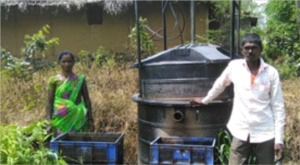
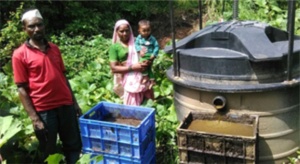
The PROM production, introduced as an enterprise mode and as a rural setup entails technical support for installation of the requisite machine, training of farmers in PROM production and quality assurance. BAIF has commissioned PROM enterprise at Nashik, Nandurbar, Maharashtrs and Navsari, South Gujarat. BAIF-PROM enterprise video link: https://www.youtube.com/watch?v=5TIiElZX9-c
Sustaining our blue green planet
The Sustainable Development Goals (SDGs) were a universal call for action to end poverty and protect the planet. These 17 Goals were built on the Millennium Development Goals, while including new areas such as climate change, economic inequality, sustainable consumption, peace and justice, among other priorities. The goals are inter-connected – often the key to success of one involves tacking issues more commonly associated with another goal.
Contribution of BAIF’s Programmes to the United Nations SDGs
BAIF Programmes directly address the following six SDGs:
SDG 1:
SDG 2:
SDG 8:
SDG 10:
SDG 13:
SDG 15:
BAIF programmes also contribute substantially towards meeting the following five SDGs:
SDG 3:
SDG 4:
SDG 5:
SDG 6:
SDG 16:
